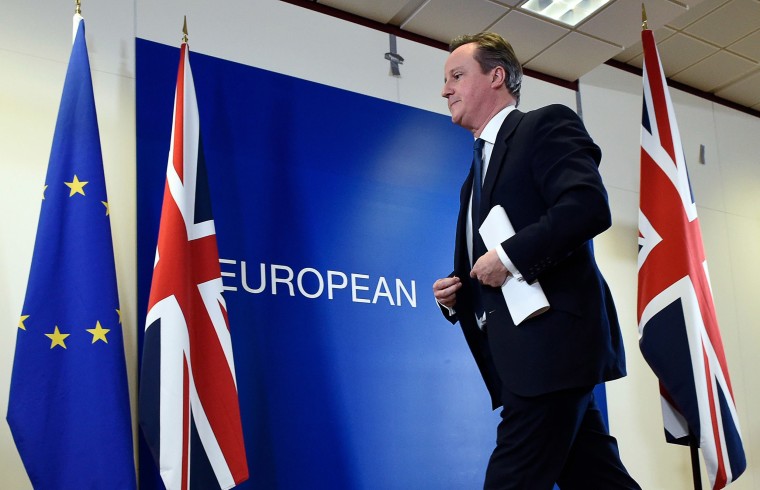LONDON — He presided over one of the most divisive votes in British history — then he left.
In the two-and-a-half years since Britain voted to leave the European Union, former Prime Minister David Cameron has stayed far away from politics and out of the public eye.
In the meantime, the referendum he presided over has brought chaos to normally staid British politics.
Does he now have second thoughts about setting the wheels of Brexit in motion? He says no.
“I don’t regret calling the referendum. I made a promise in the election to call the referendum,” Cameron said Monday night, popping up out of his car to speak with reporters. “Obviously I’m very concerned about what’s happening today but I do support the prime minister in her efforts to try and have a close partnership with the European Union. It’s the right thing to do and she has my support.”
Cameron, who resigned the morning after the vote, was succeeded as prime minister by Theresa May. She immediately pledged to honor the referendum result and get Britain out of the 28-country bloc.
However, that is now up in the air as her negotiated withdrawal agreement with the E.U. drew so little support from her own party that she was forced to pull a vote at the last minute on Monday and go back to Europe to beg for further concessions.
Both Cameron and May supported remaining in the E.U. during the referendum campaign.
With a little more than three months left before Britain officially leaves the E.U. on March 29, Cameron has been busy tweeting tributes to politicians who have passed away and highlighting the work of dementia researchers.
This is not exactly the career that Cameron imagined in 2010, when he was elected prime minister at 43 with his young, photogenic family by his side.
After five years at the head of a coalition government, Cameron led his Conservative Party to win an outright majority in 2015. But in the party’s election manifesto, there was a catch.
His party had been divided for decades about whether the U.K. should be a member of the E.U.
To help heal this rift, the Conservatives’ manifesto set out a plan to let the people have their say on Britain’s relationship with the E.U. Cameron went back to the E.U. to negotiate a better deal for Britain and then called the referendum for June 2016.
The campaign polarized the country and even saw the murder of an opposition lawmaker Jo Cox, who supported remaining in the bloc.
“He took the decision to call the referendum and it backfired. It was a high-stakes gamble and it didn’t pay off,” said Andrew Blick, the director of the Centre for British Politics and Government at King's College London.

Since leaving office, Cameron has reportedly been working on his memoirs, though they have yet to be published.
In April 2017, he was pictured in a custom-made backyard shed and said that his family was fighting over who would use it. The comments sparked the now-common social media memes that Cameron is in his shed while the government is in disarray.
Like many former U.S. leaders, he has hit the speaking circuit and is listed with the Washington Speakers Bureau agency, which also represents former Secretaries of State John Kerry and Colin Powell.
A December 2017 government report revealed Cameron was involved in bringing China and the U.K. together via a $1 billion investment fund, but his role and any outcomes remain unclear.
Cameron’s office didn’t respond to requests for comment.
“The thing about being a former prime minister is that there’s no real fixed role for them, and what they do when they leave office depends on their personal choices and the circumstances,” said Kevin Theakston, a professor of British government and politics at University of Leeds.
Meanwhile, Cameron’s wife, Samantha, has gone on to establish the fashion label Cefinn, offering “chic, grown-up fashion for the multitasking urban woman.” Dresses retail for around $375.
What Cameron hasn’t done since he left office is comment much about the work of his successor or his party now that they are implementing the referendum result.
He was just 49 when his largely successful political career came to an abrupt end.
“When you leave now, you’re finished. There’s no way back into government," Theakston said. "Your party wants to move on and often finds you an embarrassment."
He added: “In 2010, it was notable how quick leaders were to distance themselves from the [Tony] Blair era. They want to junk your memory.”
A political comeback appears unlikely as Cameron has left Parliament, unlike other former prime minsters who tried returning to front-line politics
Yet such a scenario is a possibility that Cameron biographer Anthony Seldon is unwilling to write off.
Seldon, who has written books about seven former prime ministers, thinks that Cameron is too young and charismatic to be out of politics forever.
“I think he could come back as foreign secretary and it is not beyond the bounds of reasoning that he could come back as prime minister,” said Seldon, who admitted that his is a lone voice among political experts. He said he has not discussed the future with Cameron.
Although a situation that could provoke a comeback attempt is almost impossible to imagine at the moment, Seldon said that Cameron possesses a profound sense of duty that may convince him to throw his hat back in the ring at some point.

